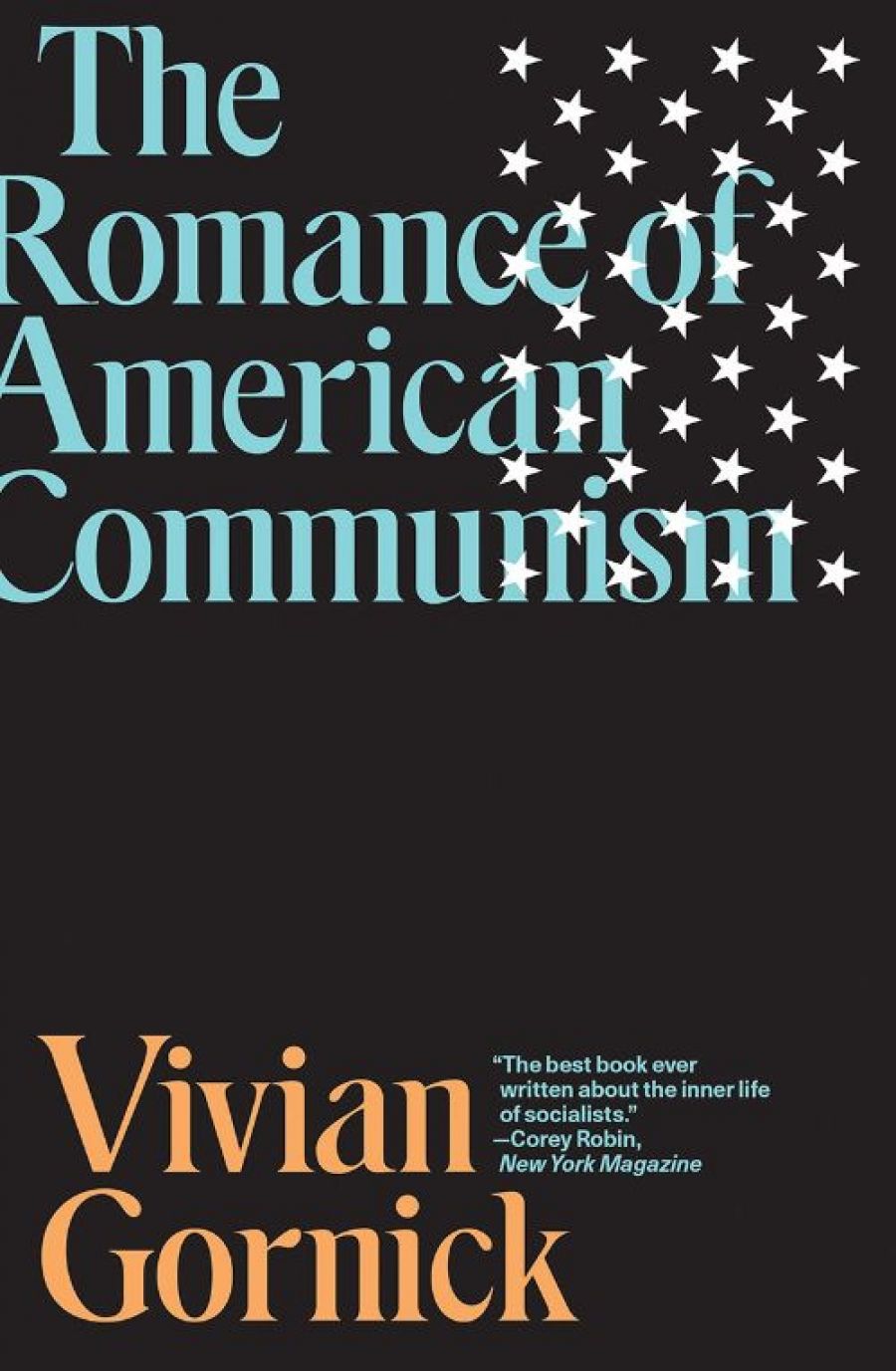
- Free Article: No
- Contents Category: United States
- Review Article: Yes
- Article Title: ‘Air, bread, light, and warmth’
- Article Subtitle: The dizzying crest of radical belief in America
- Online Only: No
- Custom Highlight Text:
In the novel Demons, Dostoevsky’s narrator describes the character Shatov as ‘one of those ideal Russian beings who can suddenly be so struck by some strong idea that it seems to crush them then and there, sometimes even forever’. This ideal person is one whose ‘whole life afterwards is spent in some last writhings, as it were, under the stone that has fallen on them’. The people who populate Vivian Gornick’s The Romance of American Communism are Americans rather than Russians, but they too are living in the last writhings of the strong idea that dominates their lives: the idea of Stalinist communism.
- Grid Image (300px * 250px):

- Book 1 Title: The Romance of American Communism
- Book 1 Biblio: Verso, $29.99 pb, 263 pp
- Book 1 Readings Link: booktopia.kh4ffx.net/Ere29
As Gornick makes clear, the book is no ex-communist exposé. Despite no longer being active party members, most of Gornick’s interviewees retain a belief in communist politics, and often their comments are similar: that the ‘years when I was a Communist, bar none, were the best years of my life’. Nearly the entire book is pitched at an intense emotional frequency. Statements such as ‘Marxism touched – and healed – that wound in the soul’ and references to the ‘visionary life’ or the ‘mystic-poetic-spiritual journey’ appear on every second page. Despite her subject matter being left-wing politics, Gornick writes in an idiom that is closer to that of existentialism, psychoanalysis, and literature. This disjunction between the book’s subject matter and the methods Gornick uses to investigate it will disappoint readers who are expecting a scholarly analysis of the period, the party, or the ideas themselves. But as the ‘romance’ of the title suggests, Gornick’s interest lies not in the politics but in the emotional texture, the individual psychology, of a communist life.
This is obviously material that excites Gornick. She has followed this interest in the subjective experience of radical politics throughout her entire writing career, from her memoir Fierce Attachments (1987), which describes growing up in a Jewish communist household in the Bronx, to her 2011 biography, Emma Goldman: Revolution as a way of life, about the Russian-American anarchist. Among Gornick’s peers, Jacqueline Rose, in her writings on the Marxist Rosa Luxemburg in the London Review of Books and elsewhere, shares a similar emphasis on the vexed connection between ‘the public world of politics and the intimacies of the mind’.
Both writers bring to their work a sensibility and a politics informed by the New Left generation of liberation movements, particularly second-wave feminism. In Gornick’s case, this inheritance is in tension with the vanguardism and mass-party politics of the Old Left she takes as her subject. ‘But where is your plan? Where is your discipline? Where is your structure?’ asks a former party member, bewildered at the new generation of activists replacing her own.
Of the book’s flaws, the Gornick of today is acutely aware. Her introduction to the new edition is self-excoriating; Gornick has internalised many of the criticisms the book received upon its original publication. She is ‘dismayed by much of the writing’, calling it ‘strangely over-written’, and mocks the fact that ‘every one of [her] subjects is either beautiful or handsome’. The latter comment rings especially true; despite the diversity of experiences described in the book, the consistency with which Gornick’s prose verges on excess can be monotonous. But time has converted some of these flaws into affectations. The book is hyperbolic, but the hyperbole is part of the fascination. Let us listen, for example, to one interviewee describing his experience of discovering Marxism: ‘It was air, bread, light, and warmth to us. For me, it was so exciting it was almost physical pain. I was high all the time. I was discovering I had a mind, I could think, and I was doing it! Not only that, the sheer intellectual joy of reading Marx … like fireworks exploding in your head.’
Just as so many of the party memberships began in a similar fashion, many ended in the same way: in dismay and disillusionment when Stalin was denounced by Nikita Khrushchev at the 20th Congress of the Communist Party of the Soviet Union in 1956.
Testimony after testimony describes the intensity of the experience of commitment, and the intensity of the void this leaves behind when it is over. One interviewee, Maurey, tells us that his ‘world was in ruins, inside and outside’ after the puncturing of his dream that he was ‘going to organise American steelworkers into the revolution like that ’.
It is a prescient time for Gornick’s book to be reissued. The populist left-wing politics of Bernie Sanders and Jeremy Corbyn have brought the word ‘socialism’ back into mainstream public discourse as something other than a pejorative for the first time in decades. The Romance of American Communism will be of great interest, if they can forgive its indulgences, to those who wish to understand the subjective experiences of a former generation of activists. For those less familiar with radical politics – a group which, given Gornick’s popular success as a memoirist, probably does not include most of her readers – the book provides a fascinating window onto what Camus calls the ‘dizzying crest’ of radical belief, the passions and devotions that accompany a concerted desire to make the world anew.


Comments powered by CComment